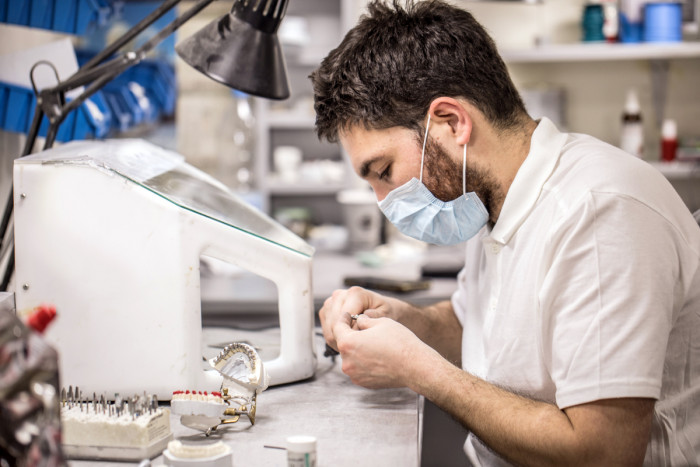Dental Technician
Kaihangarau Niho
Alternative titles for this job
Dental technicians create and repair devices for the treatment, replacement and protection of damaged, badly positioned or missing teeth.
Pay
New dental technicians usually earn
$49K per year
Dental technicians can earn
$60K-$75K per year
Source: Seek, 2023
Job opportunities
Pay
Pay for dental technicians varies depending on experience, and whether you work in the public or private sector.
- New dental technicians usually earn minimum wage.
- Dental technicians usually earn $60,000 to $75,000 or more.
Source: careers.govt.nz research, 2023; and Seek, 2023
- PAYE.net.nz website - use this calculator to convert pay and salary information
- Employment New Zealand website - information about minimum wage rates
(This information is a guide only. Find out more about the sources of our pay information)
What you will do
Dental technicians work from a mould of a client's mouth made by a dentist or a clinical dental technician, and custom-make a range of appliances for the mouth, including:
- crowns (covers for broken or damaged teeth)
- dentures
- removable orthodontic appliances (plates with wires to straighten teeth)
- mouthguards
- splints for broken or cracked jawbones
- anti-snoring devices
- teeth-whitening trays.
Skills and knowledge
Dental technicians need to have knowledge of:
- the structure and functions of the teeth, jaw and mouth
- different dental equipment, methods and materials
- modelling, shaping and sculpting
- chemistry and general science.
Those running their own business also need small business skills.
Working conditions
Dental technicians:
- usually work regular business hours, but may be required to do some evening and weekend work
- work in dental laboratories.
Entry requirements
To become a dental technician you need to complete a Bachelor of Dental Technology from the University of Otago.
You also need to be registered with the Dental Council of New Zealand, and hold an annual practising certificate.
The Vulnerable Children Act 2014 means that if you have certain serious convictions, you can’t be employed in a role where you are responsible for, or work alone with, children.
Secondary education
To enter tertiary training you need to have NCEA Level 3. Useful subjects include chemistry, biology, physics, maths and health education.
Additional requirements for specialist roles:
To specialise in an area of dental technology, such as clinical dental technology, you need to complete postgraduate study at the University of Otago.
Personal requirements
Dental technicians need to be:
- accurate, with an eye for detail
- patient
- practical
- good at planning and problem-solving
- creative.
Useful experience
Useful experience for dental technicians includes:
- work in the dental services industry, such as dental assisting
- any work requiring fine hand-eye co-ordination, such as making precision models or jewellery.
Physical requirements
Dental technicians need to have good eyesight (with or without corrective lenses) and good hand-eye co-ordination.
Registration
Dental technicians need to be registered with the Dental Council of New Zealand, and hold an annual practising certificate.
Find out more about training
- University of Otago - Faculty of Dentistry
- (03) 479 7019 - dentistry@otago.ac.nz - www.otago.ac.nz
What are the chances of getting a job?
Good demand for dental technicians
According to the Dental Council of New Zealand, there is an increase in the amount of dental technicians either retiring or leaving the profession. This means there are opportunities for graduates and experienced dental technicians to fill vacancies.
Other factors contributing to the demand for dental technicians are due to:
- New Zealand's growing and ageing population, resulting in an increasing demand for dental technicians to make dental appliances
- growing popularity of cosmetic dentistry – dental technicians are needed to prepare crowns and veneers for cosmetic procedures
- few people training for the role.
Clinical dental technician appears on Immigration New Zealand's Green List. This means the Government is actively encouraging skilled clinical dental technicians from overseas to work in New Zealand.
According to the Census, 405 dental technicians worked in New Zealand in 2018.
Work experience increases chance of employment for graduates
Most employers prefer graduates who have work experience, as well as academic training. Chances of getting a full-time job after you graduate are best if you do part-time dental technician work while studying.
Dental technicians commonly self-employed
Many dental technicians are self-employed.
They may also work for:
- dental laboratories in public hospitals
- private dental laboratories
- the New Zealand Defence Force.
Sources
- Dental Council of New Zealand, 'Dental Council Workforce Analysis 2018-2019', 31 May 2021, (www.dcnz.org.nz).
- Immigration New Zealand, Green List, April 2023, (www.immigration.govt.nz).
- New Zealand Institute of Dental Technologists website, accessed May 2021, (www.nzidt.org.nz).
- Stats NZ, '2018 Census Data', 2019.
(This information is a guide only. Find out more about the sources of our job opportunities information)
Progression and specialisations
Dental technicians may set up their own businesses, work in research and development with international dental companies, become sales representatives and technical advisers for international companies, or teach at the University of Otago Faculty of Dentistry.
Dental technicians may specialise in the role of:
- Clinical Dental Technician
- Clinical dental technicians make full dentures, partial dentures and other oral devices, and work directly with patients to provide these.
Last updated 31 March 2025


